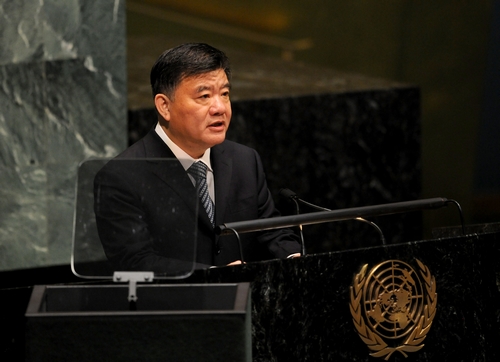| Build Consensus and Fight against NCDs | |
| 2011-09-20 04:37 | |
|
Mr. President, Ladies and Gentlemen, On behalf of the Chinese government, I would like to extend my great appreciation to the General Assembly for the farsighted visions and political will to discuss the global fight against chronic non-communicable diseases (NCDs), and to extend my appreciation to the President for his outstanding work in organizing this successful meeting. Today, globalization has led to an unprecedented level of interdependence among countries and interwoven interests. Health factors and social determinants for NCDs exist in every country. Therefore, the prevention and treatment of NCDs is an inevitable option for our common interests and the healthy road for the common development of all mankind. All the countries should through this Assembly, build consensus, adopt effective policies and measures of prevention and treatment, and actively respond to the daunting challenge of NCDs. Therefore, I would like to make three proposals. First, national health systems should be strengthened and health should be integrated in all policies. Governments of all countries should attach as much importance to health as to economic development. In particular, NCD prevention and treatment should be accorded a priority area in the national development strategies. Governments should play a leading role to create a supportive policy environment, to increase financial input, to establish multi-sector cooperation and coordination mechanisms, and to mobilize all circles of the society to participate in the prevention and treatment of NCDs. Second, we should enhance international collaboration on the basis of complementary advantages. We can strengthen technical exchanges and share experience amongst developing countries through mechanisms such as South-South Cooperation and BRICS cooperation. We shall continue to promote North-South Dialogue to expand the technical transfer and financial support from developed countries to developing countries based on the recipient countries' needs. The World Health Organization should play a leading role in the global health governance to boost the balanced development of the global health system, and to keep improving the capacity for NCD prevention and treatment. Third, activities of prevention and treatment should be aligned and coordinated, and the global consensus should be deepened. The international community must firmly implement the action plan for the global strategy for the prevention and control of NCDs. Goals and evaluation indicators for NCD prevention and treatment, which are more specific, measurable and generally applicable, such as healthy life expectancy, should be established and included in the Human Development Index. We should continue to push for the inclusion of NCD prevention and treatment as an indicator in the United Nations Millennium Development Goals. Ladies and Gentlemen, China has about one fifth of the world's population. The per capita GDP ranks about the hundredth. People aged 60 and above account for more than 13% of the total population of China. As a large developing country, China is on the track to get old before it gets rich. While we actively respond to AIDS, tuberculosis and malaria, NCDs have become the No.1 threat to the Chinese people's health. Currently there are over 260 million patients. NCDs account for 85% of causes of death and 69% of the disease burden. The rapid growth of chronic diseases will lead to the shortage of healthy workforce, the decline of life quality and the increase of socio-economic burden. NCDs have become a huge potential obstacle for economic and social development. To strengthen NCD prevention and treatment is crucial now. The Chinese government pursues a comprehensive, coordinated and sustainable scientific development concept. The core is people orientation. Health is the basis for all-round human development and the guarantee for sustainable social development. In China's 12th Five-Year Plan for the National Economic & Social Development, the Chinese government makes the average life expectancy increase by one year as a core indicator. The effective prevention and treatment of NCDs is one of the key measures. The core of the ongoing health care reform in China is to realize universal health coverage of the 1.3 billion people. The government strives to increasing investment in health undertaking, focusing on public health and basic medical services, and adjusts the ways of health resources allocation to promote combination of disease prevention and treatment. Currently, the establishment of Healthy City is being promoted vigorously across the country, and more and more local governments have integrated health promotion into the local development strategies. The health information technology development, including the ongoing e-health record project, will enhance the standardization and efficiency of management on chronic diseases such as hypertension and diabetes and health care for the elderly, which are being extensively carried out as basic public health care service items in both urban and rural areas. Meanwhile, the Chinese government actively participates in the international exchanges and cooperation in NCD prevention and treatment, and works to promote the realization of global initiatives within the framework of the United Nations and the World Health Organization. Through cooperation mechanisms such as BRICS Health Ministers' meeting and sending Chinese medical teams to developing countries regularly, China continues to explore new ways of international cooperation in NCD prevention and treatment. China is sparing no efforts in providing medical support to the developing world. The Chinese government is fully aware of the impact of NCD burden on the world's most populous country with yet unbalanced economic and social development. We will be committed to find the way of NCD prevention and treatment with Chinese characteristics. We shall continue sharing experience with the international community and make our due contribution in response to the global challenges brought by NCDs. Thank you. |
| |||||||||||||
| |||||||||||||
